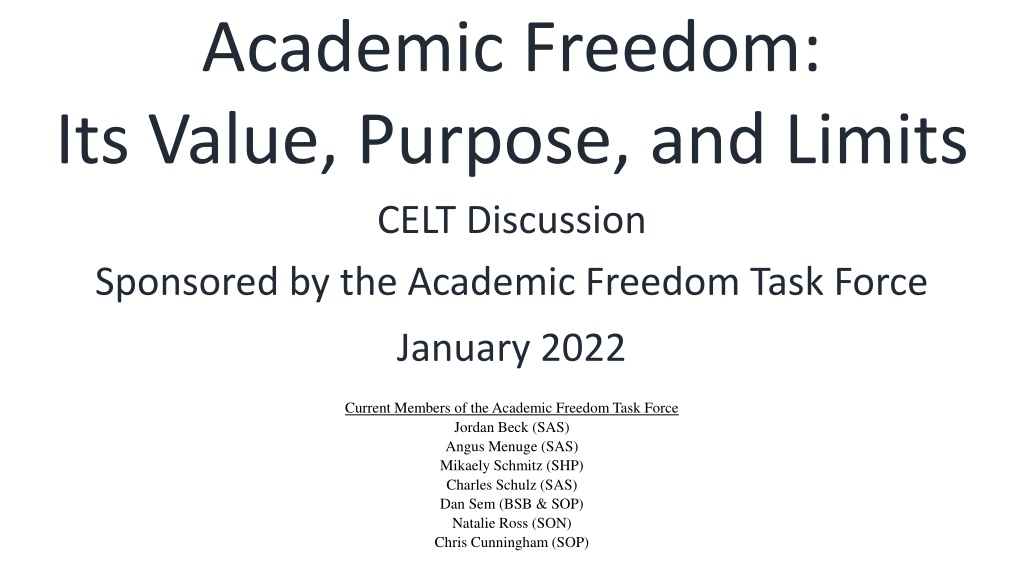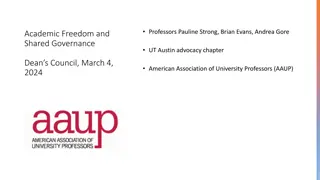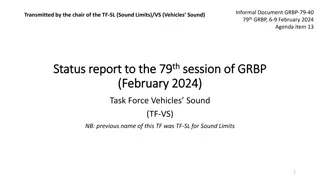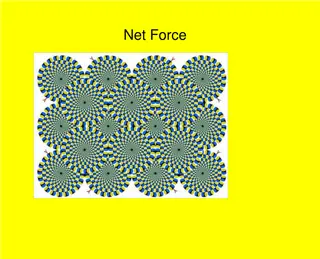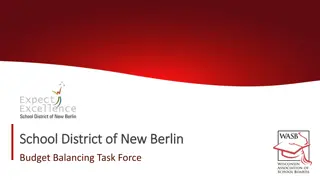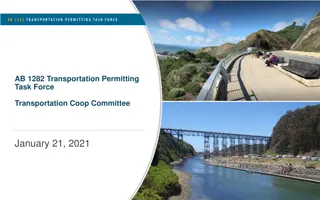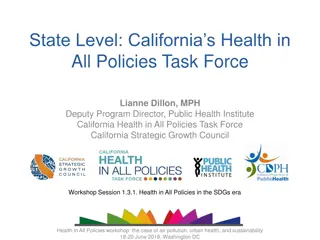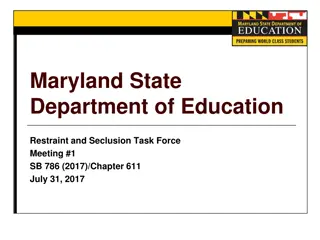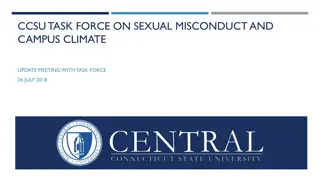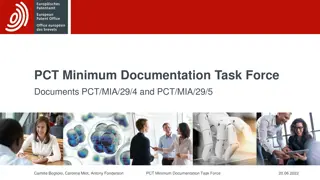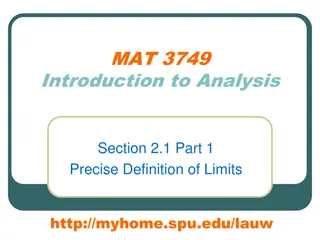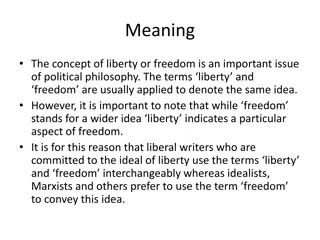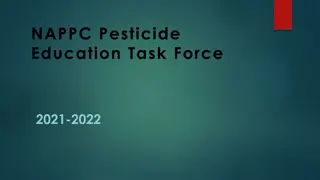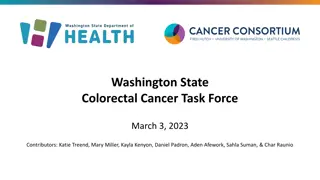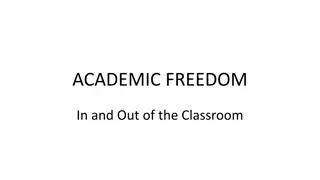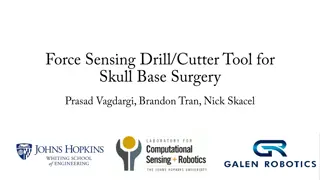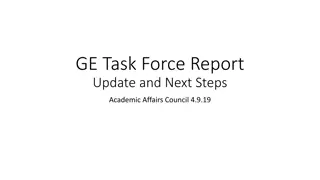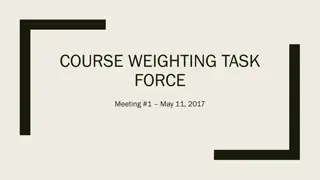Academic Freedom Task Force Discussion on Value, Purpose, and Limits
The Academic Freedom Task Force is engaging in discussions on the value, purpose, and limits of academic freedom within the context of higher education. The group aims to develop an academic freedom statement that reflects the Lutheran nature of the university while addressing diverse constituencies and providing freedoms and responsibilities for students and instructors. The process involves examining shared values and promoting honest exploration of ideas to enhance the teaching and learning experience.
Download Presentation

Please find below an Image/Link to download the presentation.
The content on the website is provided AS IS for your information and personal use only. It may not be sold, licensed, or shared on other websites without obtaining consent from the author. Download presentation by click this link. If you encounter any issues during the download, it is possible that the publisher has removed the file from their server.
E N D
Presentation Transcript
Academic Freedom: Its Value, Purpose, and Limits CELT Discussion Sponsored by the Academic Freedom Task Force January 2022 Current Members of the Academic Freedom Task Force Jordan Beck (SAS) Angus Menuge (SAS) Mikaely Schmitz (SHP) Charles Schulz (SAS) Dan Sem (BSB & SOP) Natalie Ross (SON) Chris Cunningham (SOP)
Plan for today 1) Welcome and opening prayer (5 min) 2) Description of where we are at in the process (5 min) 3) Description/Summary of the Academic Freedom Value Purpose and Limits Document (10 min) 4) Description of the major themes from the survey responses (5 min) 5) Small group discussions of the major themes presented (10 min) 6) Reporting out from the small groups to the large group (10 min) 7) Case studies: maybe 10 mins on each of 3 case studies (30 min) 8) Final large group discussion and next steps (15 min)
Where are we in the Academic Freedom process? March 2021 CUWAA ACADEMIC FREEDOM TASK FORCE Cario notes, 22 MARCH 2021 Prologue and charge Academic freedom is a set of rights and responsibilities particular to higher education. Academic freedom has roots in medieval European privileges given by particular rulers to those teaching in their universities; those privileges have evolved into a rather undefined set of rights and responsibilities that institutions of higher education are currently grappling to understand. Academic freedom is related to but not entirely consistent with freedom of speech, which limits government censorship of speech in its broadest forms. For example, CUWAA does not wish to regulate student speech outside Concordia community context. At the same time, it retains the ability to terminate employment of someone whose speech and/or conduct is not conducive to Christian standards. The charge of this task force is to develop an academic freedom statement for presentation to plenary faculty and academic council that a) reflects the Lutheran nature of our university, b) addresses the increasingly diverse constituencies and their learning needs, 3) provides freedoms and responsibilities for both students and instructors, and 4) articulates some rules of thumb for limits to academic freedom and protections for individuals. Before writing the statement proposal itself, I will suggest that we develop a set of shared CUWAA values upon which we can build that proposal. For example, I would suggest that we examine such values as a commitment to seeking truth, a recognition of human fallibility, and a generous use of charity.
Where are we in the Academic Freedom process? March 2021 CUWAA ACADEMIC FREEDOM TASK FORCE Cario notes, 22 MARCH 2021 Goals for the academic freedom statement 1. To enhance and improve the teaching and learning experience for our instructors and students by encouraging honest and respectful exploration of ideas; 2. To let truth and falsehood grapple in the pursuit of knowledge and wisdom; 3. To model a means by which Christian communities can engage in difficult conversations. Note: the purpose of this task force is not to change the CUWAA Responsibilities and Limitations statement regarding LCMS theology. Academic venues to explore a. Academic courses (private process and communication) b. Public Concordia events (public communication) c. Scholarship/research (public communication when research is public) Task Force participants Jordan Beck, plenary faculty chair, Physical Chemistry (SAS) Bill Cario, provost Arletta Frazier, Social Work (SHP) Angus Menuge, Philosophy (SAS) Rachel Pickett, Psychology (SAS) Mikaely Schmitz, Speech & Language Pathology (SHP) Charles Schulz, Theology (SAS) Dan Sem, (BSB & SOP) he s also a lawyer
Where are we in the Academic Freedom process? March - November 2021 Task force met regularly to Review various external documents Define our core values Draft a document to distribute to faculty Task force turned over entirely to faculty for next steps Jordan Beck, plenary faculty chair, Physical Chemistry (SAS) Angus Menuge, Philosophy (SAS) Mikaely Schmitz, Speech & Language Pathology (SHP) Charles Schulz, Theology (SAS) Dan Sem, (BSB & SOP) August 2021 Academic Freedom: Its Value, Purpose, and Limits document distributed to faculty November 2021 November 2021 January 2022 Faculty departments/programs provide feedback on document Task force meets to discuss plans and evaluate comments Jordan Beck, plenary faculty chair, Physical Chemistry (SAS) Angus Menuge, Philosophy (SAS) Mikaely Schmitz, Speech & Language Pathology (SHP) Charles Schulz, Theology (SAS) Dan Sem, (BSB & SOP) Natalie Ross (SON) Chris Cunningham (SOP) January 2022 CELT Events Next steps Incorporate feedback Create a document with practical examples Potentially update our current academic freedom policies
Academic Freedom: Its Value, Purpose, and Limits Outline of document Preface 1. What is academic freedom? 2. Why is academic freedom important? A. Truth B. Goodness C. Dignity 3. Core Values A. Universal values i. Humility ii. Impartiality iii. Civility iv. Liberty B. Distinctively Christian values i. Charity ii. Speak truth in love iii. Hospitality
Academic Freedom: Its Value, Purpose, and Limits Our goal is to arrive at a consensus about the content of this document, which can then be used to evaluate or further develop our policies and procedures around academic freedom. We also hope to generate discussions and promote insights which lead us all to greater clarity and confidence in the exercise of academic freedom at Concordia Preface 1. What is academic freedom? 2. Why is academic freedom important? A. Truth B. Goodness C. Dignity 3. Core Values A. Universal values i. Humility ii. Impartiality iii. Civility iv. Liberty B. Distinctively Christian values i. Charity ii. Speak truth in love iii. Hospitality
Academic Freedom: Its Value, Purpose, and Limits Academic Freedom is: a right of the professor to a degree of freedom in teaching and research. a guarantee to allow discussion and debate to go forward. subject to professional standards of competence, relevance, and respect. Academic Freedom is not: a license for deliberately propagating error or advocating violence. an excuse for incompetence. permission to indoctrinate students. Preface 1. What is academic freedom? 2. Why is academic freedom important? A. Truth B. Goodness C. Dignity 3. Core Values A. Universal values i. Humility ii. Impartiality iii. Civility iv. Liberty B. Distinctively Christian values i. Charity ii. Speak truth in love iii. Hospitality
Academic Freedom: Its Value, Purpose, and Limits Academic Freedom at CU is constrained by a requirement to support our Lutheran mission. Preface 1. What is academic freedom? 2. Why is academic freedom important? A. Truth B. Goodness C. Dignity 3. Core Values A. Universal values i. Humility ii. Impartiality iii. Civility iv. Liberty B. Distinctively Christian values i. Charity ii. Speak truth in love iii. Hospitality Faculty can and should accurately present views that disagree with our religious tradition. Faculty may not openly advocate views that disagree with our religious tradition.
Academic Freedom: Its Value, Purpose, and Limits Why is academic freedom important? Truth: All silencing of discussion is an assumption of infallibility. Preface 1. What is academic freedom? 2. Why is academic freedom important? A. Truth B. Goodness C. Dignity 3. Core Values A. Universal values i. Humility ii. Impartiality iii. Civility iv. Liberty B. Distinctively Christian values i. Charity ii. Speak truth in love iii. Hospitality Goodness: The common good depends upon the free search for truth and its free exposition. Dignity: Dignity is violated when a person is treated as an object, devoid of self- determination.
Academic Freedom: Its Value, Purpose, and Limits Core Values Preface 1. What is academic freedom? 2. Why is academic freedom important? A. Truth B. Goodness C. Dignity 3. Core Values A. Universal values i. Humility ii. Impartiality iii. Civility iv. Liberty B. Distinctively Christian values i. Charity ii. Speak truth in love iii. Hospitality Humility: The belief that our ideas may be deficient and could be improved. Impartiality: Seek out and understand the best presentation of a view we may be inclined to reject. Civility: Imagine what it is like to hold a contrary view and listen to the articulation of that view from someone who really believes it. Liberty: Research, discussion, and debate are free to advance in the quest for truth on the basis of evidence. Truth enlightens the decision-making of a self-governing citizenry.
Academic Freedom: Its Value, Purpose, and Limits Core Values Preface 1. What is academic freedom? 2. Why is academic freedom important? A. Truth B. Goodness C. Dignity 3. Core Values A. Universal values i. Humility ii. Impartiality iii. Civility iv. Liberty B. Distinctively Christian values i. Charity ii. Speak truth in love iii. Hospitality Charity: Be quick to hear, slow to speak, slow to anger. Speak truth in love: Our goal is to build up the body of Christ. Hospitality: Welcome diverse individuals into our midst.
Survey Responses: Major Themes Academic freedom is only supported when it is in the confines of the LCMS doctrine. We would like the Task Force to consider whether it is the expectation of our [faculty] not only to avoid contradicting the doctrine of our church, but also to be teaching and advocating the doctrinal positions of the LCMS. Tension As faculty, I do not believe we feel free to offer perspectives that may not align with accepted LCMS beliefs. Other Major Themes 1) Need to define Present vs. Advocate 2) Policy vs. practice 3) Need examples 4) How will it be implemented? 5) What was the impetus for this document?
Small Group Discussion of Document Overview and Feedback Themes
Case Studies These case studies depict real recent events from other institutions of higher education. The case studies will presented to you in chapters, so you can respond to different aspects of the cases as they unfold. Our goal is to simply have discussions and see how we could or would apply the ideas from the Academic Freedom document to these cases. How should faculty/administrators/ students/etc. respond to these situations if they happen at CU? We hope that these exercises form a foundation about how we can address other scenarios that may be more pertinent to concerns expressed by CU faculty. Please take some notes so that you can report out to the larger group.
Case Study 1: Perceived Racial Bias Chapter 1 of 3 A professor was working 1-on-1 in a classroom with a student of color between classes. The student expressed that she felt isolated and would like to get to know other non-white students. The professor and student wrote names of other students of color on the classroom whiteboard while brainstorming ideas. Students who later entered the classroom saw the names and protested what they interpreted to be the singling-out of non-white students. Those students filled out a bias report against the professor. Questions to consider: Were the students justified to fill out a bias report? What, in your opinion, is more important: the intent of the professor or the impact on the students? How should the administration respond to the bias report? Does this case study relate to academic freedom?
Case Study 1: Perceived Racial Bias Chapter 2 of 3 The administration, upon receiving the bias report, sent an email to the students and faculty member saying that the faculty and student involved are deeply sorry to anyone who was affected by this thoughtless and careless incident . Questions to consider: Did the administration respond appropriately? If not, how should the administration have responded to the bias report?
Case Study 1: Perceived Racial Bias Chapter 3 of 3 The professor, upon receiving the email, responded with an email stating Sorry but I don t think it s a big deal. I m just sad people get their feelings hurt so easily. Questions to consider: Did the professor respond appropriately? Does the principles of academic freedom apply to the professor s email?
Case Study 2: Political Speech on Twitter Chapter 1 of 3 After a vice-presidential debate during an election year, a history professor tweeted The moderator needs to talk over Mike Pence until he shuts his little demon mouth up. The tweet was picked up by various media outlets highlighting faculty members reactions to the debate. Questions to consider: Does this case study relate to academic freedom? Should the professor be disciplined by the university? Does a professor represent the university while on Twitter?
Case Study 2: Political Speech on Twitter Chapter 2 of 3 The tweet outraged a representative from the university s board who texted the university president and asked what was being done about it. Questions to consider: How should the president respond to the member of the university s board? Was the board member justified in contacting the university president?
Case Study 2: Political Speech on Twitter Chapter 3 of 3 The professor s contract was not renewed. Questions to consider: Was this an appropriate response from the university? Should the professor have been protected from discipline and termination by academic freedom?
Case Study 3: Intellectualism Chapter 1 of 3 A science professor states that the idea of intellectual debate and rigor as the pinnacle of intellectualism comes from a world in which white men dominated. Questions to consider: Can this idea can be taught and discussed in the professor s class? Does this case study relate to academic freedom?
Case Study 3: Intellectualism Chapter 2 of 3 The professor, therefore, has decided that her science class will have no graded assessments which include any objective responses (i.e. no True/False, no calculations, no fill-in-the-blank, etc.). Students grades will be based entirely on participation and engagement with the material in class. Questions to consider: Does the professor have the right to conduct her class and assign grades in this way? Does this case study relate to academic freedom?
Case Study 3: Intellectualism Chapter 3 of 3 The professor s chair tells the professor that given her course content, some objective measures are important and required to meet the courses learning objectives. Questions to consider: Does the chair have the right to demand that the professor use assessments with objective responses? Can the professor refuse to comply? Does this case study relate to academic freedom?
Case Study 4: Is it Hate Speech? Chapter 1 of 3 A professor of media studies gave a U.N. speech including a statement that We should have a free Palestine from the river to the sea. Questions to consider: Does this case study relate to academic freedom? Does the professor represent the university in this off-campus speech?
Case Study 4: Is it Hate Speech? Chapter 2 of 3 A member of the university s board called the speech disgusting , declaring Free speech is one thing. Hate speech is entirely different. Questions to consider: Does this case study relate to academic freedom? Was it appropriate for the member of the university s board to express this sentiment?
Case Study 4: Is it Hate Speech? Chapter 3 of 3 The member of the university s board directed the university s lawyers to look for what remedies we have. Questions to consider: Does this case study relate to academic freedom? Was it appropriate for the member of the university s board to direct the lawyers?
Case Study 5: Difficult Topics in the Classroom Chapter 1 of 4 In a political science class, a student read a sentence from James Baldwin s The Fire Next Time: You can only be destroyed by believing that you really are what the white world calls a n____. The professor leading the class asked the students if they felt it was appropriate to voice the word Baldwin had written. Later, he sent the class two essays on the politics of the N-word. Questions to consider: Does this case study relate to academic freedom? Was it appropriate for the student and professor to voice the N-word? Is there a difference between using the N-word and referring to the N-word?
Case Study 5: Difficult Topics in the Classroom Chapter 2 of 4 The next day, some students asked the professor to leave the classroom while they discussed the controversy from the previous day. They were joined by students who were not enrolled in the course. Questions to consider: Does this case study relate to academic freedom? Was this an appropriate action by the students? Should the professor comply and leave the classroom?
Case Study 5: Difficult Topics in the Classroom Chapter 3 of 4 After a flurry of emails in which the professor tried to explain himself, the university removed him from the course and suspended him pending the outcome of a formal review. Questions to consider: Does this case study relate to academic freedom? Was this an appropriate action by the university administration?
Case Study 5: Difficult Topics in the Classroom Chapter 4 of 4 Later, other professors at the university wrote an open letter that states: We believe that further conversations about academic freedom can only take place after we acknowledge that harm has been done to these students. The university should require meaningful and challenging diversity, equity, and justice training for all faculty. Questions to consider: Does this case study relate to academic freedom? Was this an appropriate action by professors? How does academic freedom relate to the open letter? Do you agree that the university should only have conversations about academic freedom if they first acknowledge that harm as been done?
